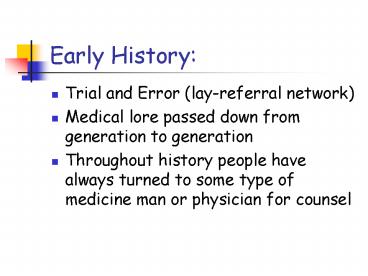Early History: - PowerPoint PPT Presentation
Title:
Early History:
Description:
Early History: Trial and Error (lay-referral network) Medical lore passed down from generation to generation Throughout history people have always turned to some type ... – PowerPoint PPT presentation
Number of Views:162
Avg rating:3.0/5.0
Title: Early History:
1
Early History
- Trial and Error (lay-referral network)
- Medical lore passed down from generation to
generation - Throughout history people have always turned to
some type of medicine man or physician for counsel
2
Ancient Cultures
- Good hygiene practices
- Paved streets, drains, sewer systems
- Code of Hammurabi
- Before science enabled us to determine pathogenic
causes of disease, spiritual explanations and
leadership prevailed
3
Greeks
- Balance of physical, mental, and spiritual
- Hippocrates and the
- atomic theory (p.43)
- Recorded observations
- between disease and
- geography, living conditions,
- climate, and diet
4
Romans
- Conquered the Greeks, but retained their medical
knowledge - Exceptional builders of water and sewage systems
- Attention to where they located towns and
drainage - Advanced study of human anatomy and surgery
5
Middle Ages
- In order for people to be protected, they built
fortresses around their property and animals - Overcrowding and sanitation
- Little emphasis on cleanliness in early
Christianity - Disease was caused by sin or disobeying God
- Time of great epidemics bubonic plague
6
Renaissance
- Beginning of change
- Disease and plague still rampant
- Bloodletting popular
- water casting
- Barbers performed surgery and dentistry
- Hygiene of royalty
7
Renaissance cont.
- Printing press invented so classical writing
could be reproduced - OK to study the human body and anatomy advanced
- Leeuwenhoek discovered the microscope
- John Graunt made advancement in epi
- health boards began to be developed in
communities
8
Age of Enlightenment
- Disease and plagues still raged
- Miasmas theory of disease took hold
- Mind and body were dependent on one another
- Edward Jenner discovered vaccine procedure for
smallpox
9
1800s (Bacterial period of public Health)
- First half of the century diseases continued to
rage - 1842 Edwin Chadwicks
- report
- 1849 John Snow and
- the Broad Street pump
- Louis Pasteur Germ theory of disease
- Joseph Lister antiseptic method
10
Health Education Promotion in the United States
- Early colonial schools
- 1647 Old Deluder law
- By mid 1800s schools were tax supported and
attendance was required - 1850 first mandate to teach physiology and
hygiene in all public schools - 1850 - Shattuck Report
11
- 1873 APHA started
- 1874-1890 Womens Crusade, later called the
Womens Christian Temperance Union - 1890s - medical inspections began
- 1901- Thomas Wood
12
- 1914 - Demonstration projects began
- 1914 WWI, 1st large scale measure of health
status of Americans - 1920s-1930s many studies designed to clarify
the role of health education - Great Depression, 1929-1941
- WWII, 1939-1945
13
- 1950 Health Education was emerging as integral
part of elementary, secondary, college
curriculum
14
1970sThe Era of Prevention
- 1971 Coalition of National Health Organizations
formed - 1974 LaLonde Report
- Health Field Concept
- 1974 CDC was established
- 1979 Healthy People The Surgeon Generals
Report on Health Promotion and Disease Prevention
was published
15
1980s
- Promoting Health Preventing Disease Objectives
for the Nation - Initial Role Delineation study for Health
Education - Examination of professional preparation programs
and professional competencies - First Certified Health Education Specialists
(CHES) recognized
16
1990s
- National Health Education Standards published
- Responsibilities/competencies for entry-level
Health Educators published - SOC designation for Health Educators
- Competencies Update Project (CUP)
17
2000s
- Unified Code of Ethics
- Report of Joint Committee on Health Education
Promotion Terminology - Promotion of CHES
- Revised national HE competencies (3 levels) based
on CUP - Outcome-Based Education Practice































